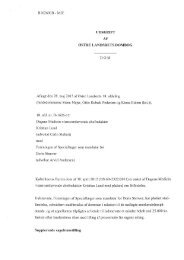Patientperspektivet på læge-patientrelationen i ... - Dagens Medicin
Patientperspektivet på læge-patientrelationen i ... - Dagens Medicin
Patientperspektivet på læge-patientrelationen i ... - Dagens Medicin
You also want an ePaper? Increase the reach of your titles
YUMPU automatically turns print PDFs into web optimized ePapers that Google loves.
diseases. The unsatisfactory doctor-patient relationship is, according to the patients, a relationship<br />
characterised by ignorance and lack of listening from the GP‟s part, i.e. humiliation. This is also<br />
seen in other empirical studies [28,29]. Ignorance was by the patient considered to be a humiliation<br />
of the patient‟s identity. The results are in agreement with an article that describes humiliation in<br />
theoretical terms [30]. According to the article, the GP may, inadvertently, humiliate the patient,<br />
because the medical profession legitimises objectification in the doctor-patient relationship. Our<br />
study confirmed that. If the GP humiliates the patient through indifferent behaviour, the relationship<br />
with the GP is not satisfying even though the relationship continues.<br />
Implications for future research and clinical practice<br />
The study showed that GPs cannot take it for granted that their patients on their list are satisfied,<br />
even though there is a long-term relationship between them. Some patients stayed even though they<br />
were dissatisfied. Future research is needed to explore why patients stay with a GP they feel<br />
humiliated by. It was interesting that the trainees were able to make all of the 10 patients satisfied.<br />
A recently published study confirms that good communication skills of GPs, whether they are<br />
familiar with the patient or not, enable patients to discuss any issue [31]. However, future research<br />
is needed to explain why patients who were satisfied with the trainee often preferred to see their<br />
regular GP. This study showed that a regular GP is particularly valuable to the patients as long as<br />
the GP is recognising in his behaviour. This is vital knowledge to GPs as well as to administrators.<br />
The tendency is to expand the sizes of practices without considering how to maintain interpersonal<br />
continuity. This would be a reduction of quality, which has also recently been shown [32].<br />
Conclusion<br />
If the patients felt recognised in the consultation they were satisfied with the relationship, also if it<br />
was with an unfamiliar GP. However, if the patients were satisfied with their regular GP, they often<br />
preferred to see this GP continously, and interpersonal continuity became valuable. It created a<br />
sense of security. But if the patients felt humiliated by their GP, or if the GP did not remember them<br />
as a person, interpersonal continuity had no added value. The theoretical concept of recognition has<br />
two different meanings and the point is that the GP has to do both, respect and remember the<br />
patient, in order to create and sustain a satisfying relationship.<br />
93








